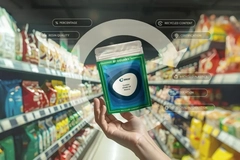
28 Jun 2018 --- “Plastics are supposed to be smart too” was the concluding note of the opening for a new joint research platform commencing in Colombia, between Fraunhofer Institute for Applied Information Technology (FIT) and the Instituto de Capacitación e Investigación del Plástico y del Caucho (ICIPC), coined: Sustainable PlastIcs and Related IoT (Internet of things)-Applications (SPIRIT).
The idea for the joint research platform grew out of a long collaboration between the Fraunhofer FIT and ICIPC. The two institutes with their complementary fields of activities intend to cooperate closely in their research on smart plastics.
“Besides smartphones, smart cities and smart data, plastics are supposed to become smart, too,” they state.

“Our research will focus not only on the societal challenges involved in the sustainable use of plastics but targets the Colombian industry and German companies in Colombia,” says Dr. Markus Eisenhauer, initiator of the project at Fraunhofer FIT. Together with Dr. María del Pilar Noriega Escobar, the director of ICIPC, he signed the cooperation agreement in the festive opening event hosted in Medellin.
PackagingInsights spoke to Eisenhauer about the research: “We are following the idea of circular economy. The idea is to foster the sustainable use of resources and especially track the use of plastics. This is of utmost importance for a country like Colombia, with the second highest biodiversity in the world.”
“I am convinced that smart plastics (the combination of IoT and specified designed material properties) will play a crucial role in enhancing sustainability and establishing a circular economy. There is still a long way to go, but every step that brings us closer to a better (real-time) monitoring allows better focused and better-suited measures,” he adds.
Eisenhauer uses an example from the Colombian Food Industry to illustrate the goal of the combined expertise: “The packaging has been designed according to the needs of the product and IoT helps by adding sensor information to determine, e.g., the perishability of the product. This is an example that stands for what the research platform is aiming to do: combine the expertise from ICIPC in plastics and that of Fraunhofer FIT in IoT to create a smart product.”

Initiator of the project at Fraunhofer FIT
The IoT allows the digitalization of the environment and objects, so that they can become an active part of it, he explains, and a first step could be the passive and active tags that allow the tracing for plastic items, and a seamless IoT infrastructure allows to add value-added services that turns plastic into a smart product.
Essentially, Fraunhofer FIT will bring their expertise in R&D on the Internet of Things, user-centered design (UCD) and smart data to the cooperation, while ICIPC, a not-for-profit organization, will contribute their experience in the production and processing of polymer plastics and their contacts to the Colombian and German industry.












